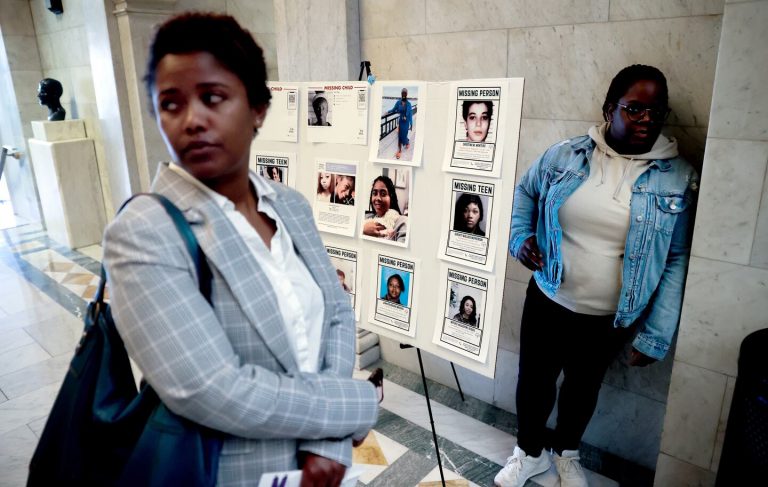If passed, Massachusetts could join other states that have introduced and passed similar efforts. California has an Ebony Alert law in place, and Missouri and Alabama are considering similar legislation. The bill in Massachusetts remains in committee.
Black women make up a disproportionate share of missing persons investigations on the national level, advocates said. While Black women constitute seven percent of the country’s population, they account for one in five of all US missing persons cases, advocates said Tuesday.
On state and local levels, advocates said it is difficult to determine the exact racial disparities in missing persons reports because there’s little protocol on logging and tracking these figures. This makes any targeted research on the issue hard, but many of the Black women supporting the bill Tuesday attested to the problem from personal experience.
The gaps in reporting and coverage are systemic, said Alexandria Onuoha, a Suffolk University doctoral student who’s centered her research around the development of Black girls.
The fact that families might go months before reporting a missing person to law enforcement adds to the existing disparities, said Ann Marie Robertson, a detective lieutenant in the state’s State Police Unresolved Case Unit. People might be afraid to go to police for help because of a prior record, their immigration status, or distrust, but Robertson said reporting is the first step.
“We’re going to look for them no matter what,” Robertson said.
On a state level, the exact racial disparities in the reporting and attention given to missing persons investigations is difficult to determine — mostly because data and tracking of such cases is fragmented.
A 2023 Globe review of the state’s current approach to such cases found that there was no standardized system for handling these types of investigations. There’s no synchronization between NamUs, a federal repository of missing persons reports across the US, and what Massachusetts police submit to the FBI’s National Crime Information Center, or NCIC, an internal database only available to law enforcement. As of March 2023, missing persons reported to NamUs accounted for less then a tenth of active missing persons investigations in Massachusetts.
The Globe review also determined that the likelihood of a missing person case being reported and followed through by law enforcement depends on the local police force assigned, the persistence of advocates, and the missing person’s social status. Many times, that boils down to race, immigration status, income level, gender, and age, according to the Globe’s reporting.
Colonel John E. Mawn Jr., interim superintendent for the Massachusetts State Police, said Tuesday there are 1,750 missing persons cases from the state in the FBI’s NCIC. Through some internal trainings, the number of cases submitted to NamUs has increased to just under 200.
It’s progress, Mawn Jr. and Robertson agreed, but not enough.
“If we can get every police department to put those 1,750 people into our database, it will help,” Robertson said.
Better data is the first step towards eliminating any disparities, advocates agreed. Mayowa “MO” Osinubi, cofounder for Mics for the Missing, a local group spreading awareness about missing people of color in New England, compared data for advocates to “food for a chef.”
“It raises collective intelligence around these issues,” Osinubi said. “Then, we’re able to come together as researchers, as community organizers, to address this crisis.”
On Beacon Hill, government officials have taken some steps at ironing out the state’s murky missing persons protocol. In 2017, the Charlie Baker administration commissioned a task force to craft recommendations to make the reporting process more efficient. The group finished a four-page report with many suggestions, including requiring police and medical examiners to report to NamUs and hiring a missing persons coordinator.
The state has coordinated five virtual trainings over the last three years that give law enforcement a primer on skills useful for missing persons cases such as navigating NamUs, social media analysis, as well as digital, video, and mobile forensics. These trainings aren’t mandatory for state police.
With such pitfalls in the approach to missing persons cases regardless of race, Onuoha said it’s crucial lawmakers approve the bill.
When advocating for the Black community, “we get the question of why: Black women and girls?” Onuoha said. “But why not? It’s been shown that when resources are allocated towards Black women and girls, it helps everyone.”
Tiana Woodard can be reached at tiana.woodard@globe.com. Follow her @tianarochon.




